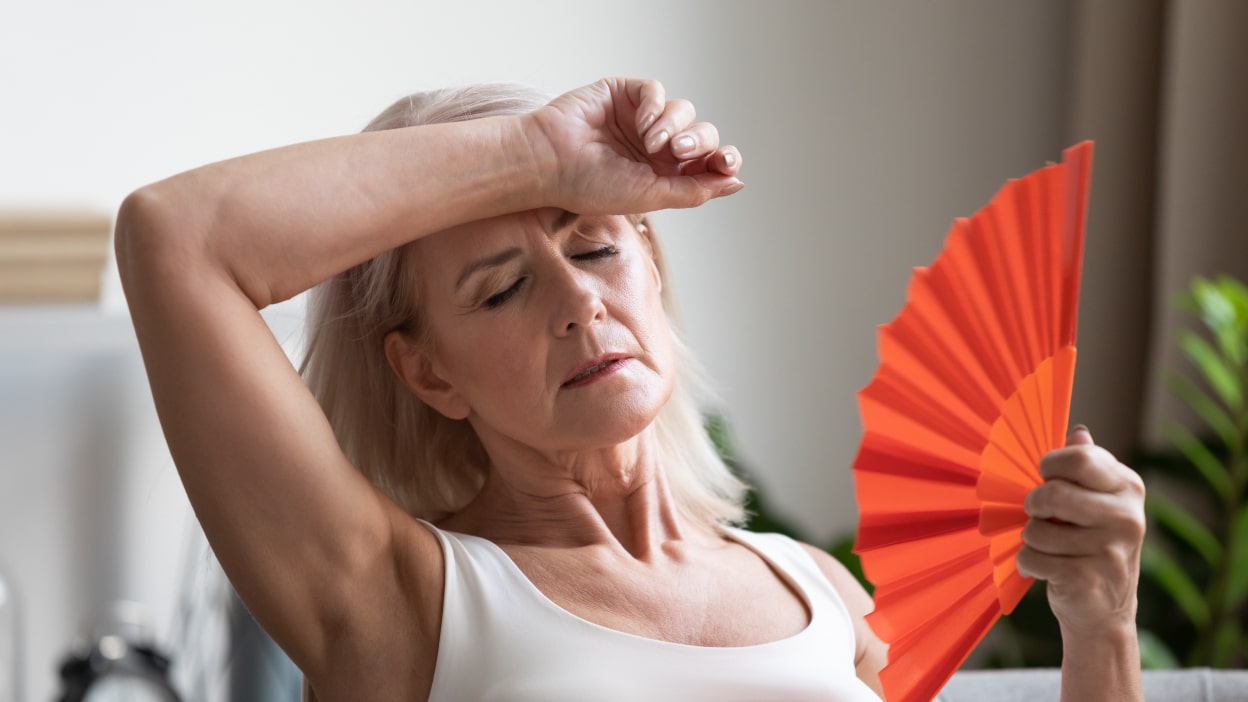Menopause & Perimenopause FAQs
Menopause & Perimenopause FAQs
We understand that it can be a difficult time as your body starts to go through changes. That's why Poise has curated answers to some frequently asked questions to help you navigate through Perimenopause and Menopause.
My Body Odour Is Stronger Now That I’m in My 40s. What Can I Do About the Smell?
Hormone fluctuations that occur in in your forties can sometimes contribute to an increase in perspiration. If nothing seems to be helping, you should discuss this with your doctor.
Why Does It Seem Like My Breasts Are Getting Bigger Now That My Hormones Are Declining?
The redistribution of fatty tissue during menopause can contribute to a growth in breast size and abdominal size. Breast tissue is mainly made up of fat. As we age, if we are not exercising regularly to include both aerobic and light weight training, many areas of our body will lose muscle mass and gain fat.
My Hormones Are Normal, but My Periods Are Irregular. Am I in Menopause?
There are many reasons why one's periods may be irregular, perimenopause being amongst the most common. If you are in your 40s and all other possible reasons for irregular periods have been ruled out, by default this is probably perimenopause. It isn't until late in the process that your hormone blood tests may change to demonstrate menopausal levels.
How Long After a Complete Hysterectomy Will Menopause Start and Will It Be Different Than Normal Menopause?
If you have had your uterus AND both of your ovaries removed (bilateral oophorectomy is the formal term) and have not yet gone through menopause, you can expect to experience symptoms almost immediately, typically within days of your surgery. These symptoms are more immediate and often much more severe than a natural menopause as your hormone levels decline much more rapidly in this setting. So you are more likely to need hormonal treatment to help you adjust after surgical removal of the ovaries compared to someone who goes through menopause naturally. Before the surgery, we encourage you to have a detailed conversation with your surgeon regarding the risks and benefits of removing the ovaries, as well as a detailed plan for managing menopausal symptoms when they arise.
Can You Test for Menopause? How Do You Know When It Will End?
Can You Test for Menopause? How Do You Know When It Will End?
I Don’t Just Have Hot Flashes; I Have Cold Flashes, Too. Are Cold Flashes Normal?
A feeling of being chilled after a hot flash is very common and considered normal. If the feeling of being chilled is not associated with a hot flash, it's probably best to discuss this with your doctor.
If I Take Birth Control Pills Will I Still Get Perimenopause Symptoms?
As long as you are on a pill that contains estrogen (as most birth control pills do), your menopausal symptoms may be masked or controlled. Ultimately, your ovaries are going through the change but you may not be able to sense it as your periods are regulated and you don't experience estrogen withdrawal symptoms due to the estrogen you are ingesting. Many women will notice hot flashes during their spacer pills (those pills with no hormones at the end of your pack), so that can be a clue. Once you stop taking the pill, you will have all the symptoms which tell you the change has been occurring.
I Take Hormones for Heavy Periods but Are They Safe for Long-Term Use?
If a couple of years of hormonal treatment is all that is needed to carry you over until menopause, this can be a very safe and elegant approach to this troublesome problem. Prolonged use, over 5 years, may contribute to some problems such as bone loss or increased breast cancer risk. So typically around that 5 year mark is when we encourage you to reassess all your long-term treatment options with your provider.
Why Do My Periods Seem to Last Forever?
During the perimenopause, your hormone levels decline and the ovaries no longer ovulate reliably and predictably each month like they used to. The lining of the uterus gets out of balance due to these fluctuations in hormones and this results in unpredictable bleeding patterns. Some women are lucky and their periods simply space out and get shorter and lighter; many women are less fortunate and their periods get heavy, prolonged and more frequent.
Is It Okay to Have Another Period After Not Having One in a Year?
Any bleeding or spotting after one full year with no menstrual period should be evaluated by your doctor. There is usually a simple explanation as to why this is happening.
Is Brain Fog Caused by Menopause Permanent?
No, Brain fog is most bothersome during the perimenopause phase of menopause. Fortunately for most women after the hormone fluctuations balance out, brain fog and fuzzy thinking ease up considerably. You'll never have the memory you had at 30, but most days you will remember your best friend's name and where you parked your car.
Is There Any Benefit to Getting a Hormone Panel Done?
Hormonal testing can be of some value in trying to determine if symptoms may be related to menopause or other hormonal disorders such as thyroid disease. But in general, hormone testing is less useful than many assume. Hormone testing is not an appropriate way to manage hormone replacement therapy - this is determined by symptom control, not blood levels.
Our ovaries have a built-in clock, so the timing of menopause is likely genetically predetermined long before the first signs of menopause appear. Hormonal treatment, such as birth control pills, may mask the signs and symptoms of menopause but ultimately will not postpone it. Certainly, there are some exposures in our life that may hasten the timing of menopause, such as chemotherapy, pelvic radiation or surgical removal of the ovaries. But there is no reliable "fountain of youth" that can stop the inevitable decline in ovarian hormone production or fertility.
Why Do I Have So Many Lapses in Memory?
It's called menopause brain fog and a healthy diet and exercise can help. Keep your mind sharp with cardio and make sure to feed your brain healthy foods. Eat plenty of fruits, vegetables and other foods with omega 3 fatty acids. Check your vitamin D levels, too. In a recent study, women who have recently gone through menopause showed an increase in some types of platelets that can lead to blood clots, which increases the risk of effects on your brain, particularly your memory.
Once I Start Menopause How Long Does It Last?
It's different for every woman. The average length of time is approximately two to five years.
Are There OTC Products I Could Use in Place of HRT?
There are many products you can purchase over the counter (OTC) to try and ease symptoms of menopause. Black Cohosh has been used for decades to ease hot flashes. Products that contain soy isoflavones generally work well too. Keep in mind that not all OTC products are regulated by the FDA so quality and efficacy can be a concern. Always check with your doctor when obtaining a new prescription and taking OTC, as many don't interact well together.
At What Age Will I Stop Having Periods?
Every womens body is different with unique body chemistry. However, late 50s is at the higher end for the normal age of menopause. For additional questions, check with your doctor who can help advise you based on your medical history.
What’s Causing the Change in My Vaginal Odour?
There are many things besides infection which may contribute to changes in vaginal odour. Fluctuations in the female hormones during menopause strongly affect the health of the vaginal tissue. This often contributes to changes in the pH, changes in the micro flora of the vagina, and light bladder leakage all of which may result in changes in odour.
What’s the Difference Between Perimenopause and Menopause?
Perimenopause means "around the menopause" and is the first of three phases that completes the menopause transition. Perimenopause mimics puberty with irregular menstrual periods, mood swings, irritability, fuzzy thinking, and occasional hot flashes. Menopause is the second phase and requires twelve months of no periods or spotting to complete this phase. Hot flashes, night sweats, mood swings, decreased libido, and vaginal dryness are the hallmark symptoms of this phase. Read our article on the stages of menopause for more information.
Why Am I Still Experiencing Hot Flashes, Insomnia and Other Menopause Symptoms if I’m Postmenopausal?
Many women will continue to have hot flashes, trouble sleeping and other symptoms like low libido or pain with sex after they have completed the menopause transition and are considered postmenopausal. It's important to discuss your symptoms with your doctor to discuss a plan to help ease these symptoms.
Why Is Intercourse So Painful Now?
Sexual dysfunction is unfortunately extremely common after menopause. The lack of hormones, especially lack of estrogen, profoundly impacts the health of the tissue of the vagina and vulva. These tissues atrophy, or thin out, and scarring can happen which literally shrinks the width, length and caliber of the vagina. Loss of vaginal lubrication is another part of the equation. An accompanying loss of libido, which is not inevitable but is extremely common, only further compounds the problem. There may be many other reasons for pain aside from menopause contributing to pain - such as pelvic infection or pelvic masses - that need to be ruled out. If you are experiencing pain with intercourse, it can be very beneficial to have a detailed evaluation.
Recommended Products
Absorbency Level
Absorbency Level










